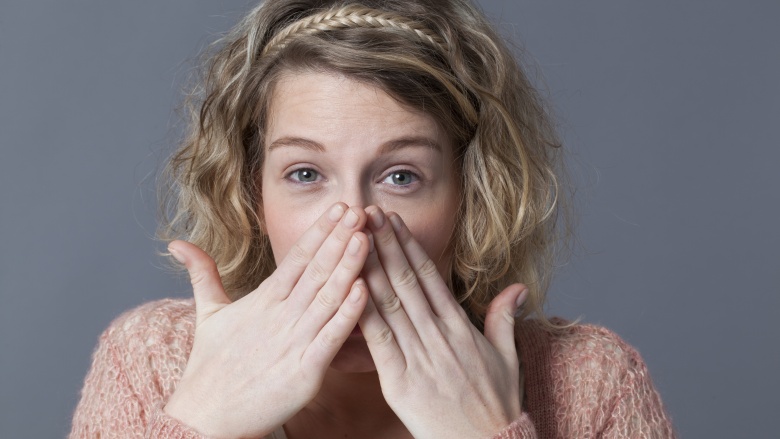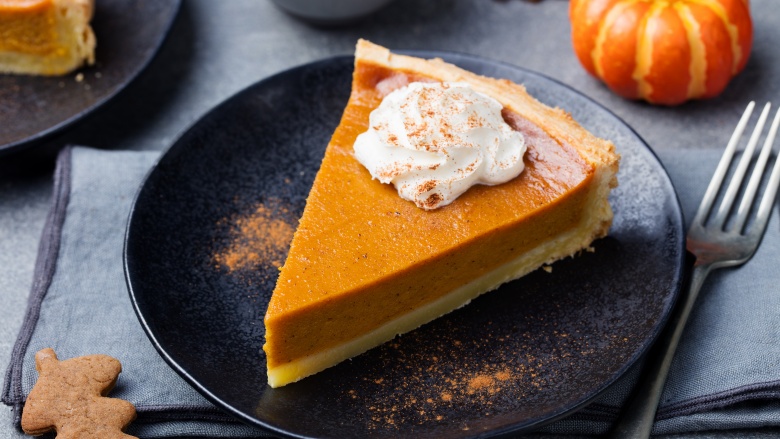What Really Happens To Your Body After Thanksgiving Dinner
That delicious holiday that sometimes gets forgotten is finally here. Even if you've already embraced that radio station that started playing Christmas music the morning after Halloween, don't forget turkey day. Thanksgiving provides a chance for us to celebrate being with family and friends while thinking about all the blessings in our lives.
It's also a time to indulge in some pretty amazing food. From whipped mashed potatoes to creamy gravy to light and fluffy pumpkin pie, you can't deny the appeal of a day full of food and family. Unfortunately, all that excitement can lead us to ignore our feelings of fullness and go for those second or third helpings. We've all experienced that Thanksgiving food coma, but what exactly is happening in our bodies as we reach for yet another helping of sweet potatoes?
You'll start burping
Yep, you read that right. One of the first symptoms you'll notice after a big Thanksgiving meal is burping. So if you're spending Thanksgiving with your boyfriend's family for the first time, go easy on the second helpings. In a video released by the American Chemical Society, researchers explain that one of the reasons we feel so full after a large meal is because of the amount of air in our stomachs. One of the ways our bodies get rid of that excess air is by burping. If you followed your meal with a soda or sparkling wine, your body will have even more gas to get rid of. Make sure to drink plenty of water and go slow.
You'll feel sleepy
We often hear about feeling sleepy after Thanksgiving dinner because of all the tryptophan in turkey. Tryptophan is an amino acid in turkey that can cause drowsiness in large doses (especially when you're pairing it with tons of carbs), but it shouldn't get all the blame. Because let's be honest, it's not like your plate only consisted of turkey. Remember all that stuffing, mashed potatoes, and pie?
Eating a large meal with a lot of carbs causes our blood sugar levels to spike and then plummet. This fall in blood sugar causes our energy levels to crash as well. A fall in blood sugar can also cause our brains to activate the neurons that promote sleep. As you're making your dinner plate, try to limit your carbs to just a few small helpings to help with that food coma later.
You may not sleep well that night
It seems odd that a big meal can make you sleepy and then keep you from sleeping that night. Unfortunately, that a big meal can affect our internal clocks, messing with our sleep cycles. Northwestern University endocrinologist and molecular biologist Dr. Joe Bass told NPR that studies show that overeating actually disrupts your restful sleep at night. "If mice eat a high-fat diet, they actually wake up during what is nighttime for them and eat," he explains. "It would be as if you were waking up every night during holiday season and eating all the sweets in your refrigerator." To help with the sleeplessness, go easy on the more fattening foods at dinner.
Hello heartburn
Although heartburn can feel like a serious cardiac issue, it's often just caused by overeating. Considering the fact that 42 percent of Americans have experienced heartburn at some point in their lives, it's worth noting that it can be prevented.
When we overeat and fill our stomachs to capacity, some of that stomach acid that's meant to break down food in the stomach gets pushed back up the esophagus. This acid isn't meant to leave the stomach, so can cause a burning sensation when it hits the esophagus tissues. Speaking from experience, heartburn is incredibly uncomfortable.
Eating a meal high in fat content is more likely to cause heartburn, so take a good hard look at your Thanksgiving plate before diving in. Make sure to fill up on the salad and vegetables first, so you're not as tempted to go straight for the macaroni and cheese or buttery mashed potatoes that could cause some serious pain after dinner.
Your asthma may act up
Depending on what time you're planning on serving dinner this Thanksgiving, you could be in for some serious asthma symptoms. A study in The American Journal of Gastroenterology found that participants with asthma who ate a large meal before bed had significantly more asthma symptoms than those who ate earlier. This is serious for anyone with asthma, but especially those who have had trouble controlling their symptoms in the past. A large meal before bedtime can lead to a night full of coughing, wheezing, and even feelings of suffocation.
Let's be honest. Even if you don't have asthma, eating right before bedtime is never a good idea. You just won't feel good about it. So if you're serving the big traditional Thanksgiving spread, plan an early dinner. This way everyone can indulge and have plenty of time to rest, socialize, and maybe even play a game of family touch football before heading to bed.
Don't make it a habit
As anyone who has ever struggled with their weight will tell you, overeating can be addictive. It doesn't matter how much you want to be healthier or how much willpower you have. When your body craves more food, it's incredibly difficult to stop eating. Indulging once a year at Thanksgiving is one thing, but if the huge dinners start becoming a regular thing, it can be hard to stop. Just like taking drugs, eating can cause our bodies to release the feel-good hormone dopamine. This sets up a reward response in our brains. The release of dopamine feels good, so we crave more.
Dr. Sasha Stiles, a family physician who specializes in obesity at Tufts Medical Center told NPR that overeating on a regular basis actually changes our brains. "When you overeat time and time again, this electrical conduit pathway gets tired and it doesn't tell your brain that you're full anymore," she explains. "It may send abnormal signals and you may not even realize you're full."
Why can't we stop?
There are plenty of theories out there as to why we can't control ourselves around food. French scientist Jacque Le Magnen made a discovery in the 1950s that may explain why we keep piling on the food at Thanksgiving. In his research, he found that his lab mice had stable weights when they were fed their standard chow. However, when Le Magnen fed them different flavors of chow, their intakes went up dramatically. This theory of sensory-specific satiety hypothesizes that we can quickly become bored with one flavor, but when our tastebuds are continually surprised, we want more.
So if you only ate turkey on Thanksgiving, you'd probably stop pretty quickly and move on to football. Instead we fill our plates with ten different delicious dishes, so our taste buds go crazy and want more. That could explain why we still want dessert after eating a huge meal.







